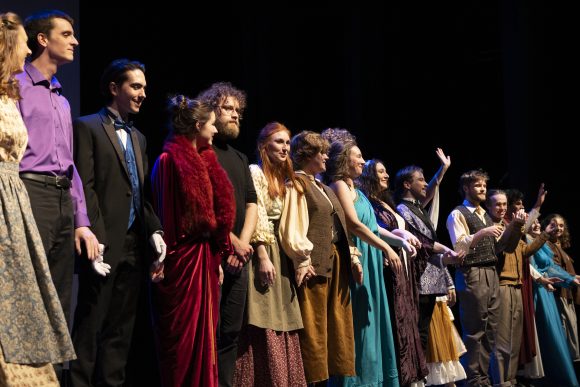
The opera performers and music pianists bow and wave to the audience after the Eklund Opera Scenes performances on Thursday, Nov. 30, 2023. (Clementine Miller/CU Independent)
The Annual Eklund Opera Scenes, a collage of classic and contemporary student performances, premiered free to the public on Thursday, Nov. 30.
Graduate and undergraduate students at the University of Colorado Boulder took to the stage to present scenes with themes of socioeconomic disparity, desire and the conflict between dreams and obligations. Scenes varied from the Baroque period, starting in the 17th century, to the more contemporary.
“It’s really interesting to be involved with something that is historic,” said Marcus Schaller, an undergraduate student who sang in several scenes. “It’s something that has hundreds of years of performance practice.”
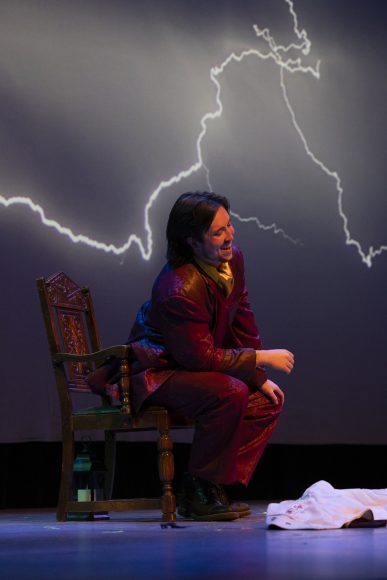
Marcus Schaller as Figaro in the scene “Non son Lindoro … zitti, zitti, piano, piano” from the opera “Il Barbiere di Siviglia” on Thursday, Nov. 30, 2023. (Clementine Miller/CU Independent)
Costuming and props were minimal, and the use of space was a major consideration in the performances.
In the opening scene from “La Cenerentola,” or Cinderella, performed by undergraduate students, the prince changed into “beggar’s clothes” off-stage but visible to the audience. Once he entered the scene in his disguise, the audience was aware of his true identity, while the other characters were not.
The scenes played with the typical boundary between actors and audience, which not only aided the sense of irony but also engaged the audience with these historic pieces.
The character Cupid from “L’incoronazione di Poppea,” played by Kailyn Martino, looked frantically into the audience while spying on the attempted assassination of the sleeping Poppea.
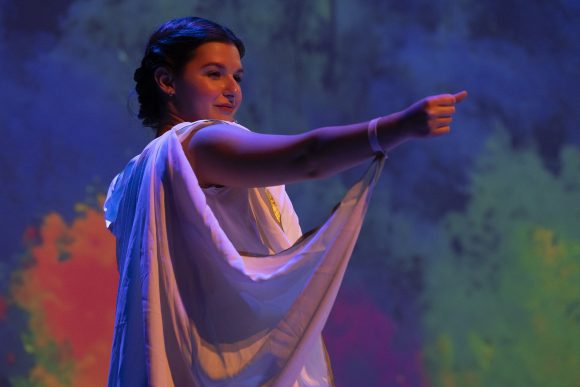
Kailyn Martino as Amore (Cupid) poses during the performance of Act II, Scene 14 from the opera “L’incoronazione di Poppea” on Thursday, Nov. 30, 2023. (Clementine Miller/CU Independent)
“This is the first time I’ve ever done an early opera. I’ve never done anything that would be considered Baroque, so this was a very different beast,” said Caitlyn Fuller, the graduate student who played Poppea.
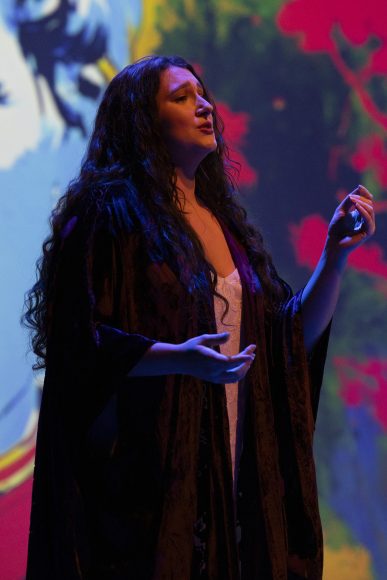
Caitlyn Fuller as Poppea sings during the performance of Act II, Scene 14 from the opera “L’incoronazione di Poppea” on Thursday, Nov. 30, 2023. (Clementine Miller/CU Independent)
The contemporary relevance of these pieces is easily overlooked as opera is struggling to attract a younger audience. However, Leigh Holman, director of the Eklund Opera Program at CU Boulder, said she found opera to have a constant relevance.
“We’ve been telling stories with songs since the beginning of time,” she said. “And that’s all opera is- is just a song-story… It’s a way of expressing oneself that you just can’t do with the spoken word.”
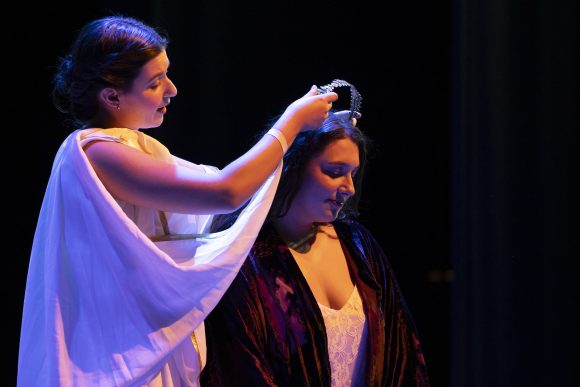
Kailyn Martino as Amore, left, places a crown on Poppea played by Caitlyn Fuller during the performance of Act II, Scene 14 from “L’incoronazione di Poppea” on Thursday, Nov. 30, 2023. (Clementine Miller/CU Independent)
Many of the operas were performed in their original Italian. Despite the English words being displayed on a screen above, the actors interpreted and translated through their expressive performances. Additionally, the piano, played by Max Randal and Christopher Powell, acted as a major contributor to the emotions of the pieces.
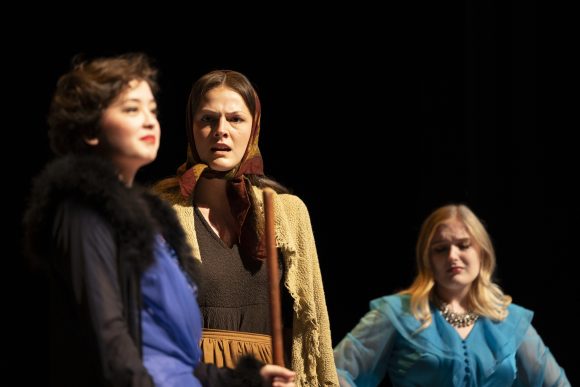
Kaori Quan, left, as Clorinda; Norah Schaefer, middle, as Angelina and Mya Busch, right, as Tisbe in the opening scene from the opera “La Cenerentola” on Thursday, Nov. 30, 2023. (Clementine Miller/CU Independent)
“For my scene in particular, I found the most collaboration with the pianist,” said Fuller. “If you’re listening super carefully to the piano, they are really coming in when I’m not singing. So it’s basically a duet.”
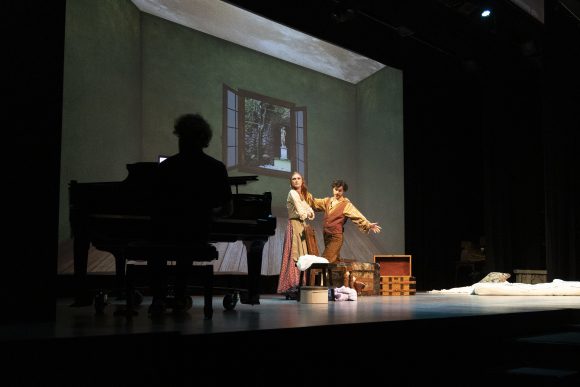
Pianist Christopher Powell, left, performs while Benaiah Axlund as Figaro and Sydney Grimm as Susannah sing during the performance of Act I, Scene 1 from the opera “Le nozze di Figaro” on Thursday, Nov. 30, 2023. (Clementine Miller/CU Independent)
The immersive nature of the performance garnered enthusiastic applause from the audience as all actors joined onstage to take their final bow.
“I think the way that the emotions are heightened and beautified [in opera] is so juicy for an audience,” said Fuller. “And I think it gives the audience a chance to get transported to another world…”
Contact CU Independent Breaking News Editor Ann Marie Vanderveen at ann.vanderveen@colorado.edu.
Contact CU Independent Assistant Visuals Editor Clementine Miller at clementine.miller@colorado.edu.
